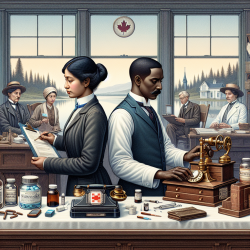Introduction
In the complex world of healthcare, the interplay between different professions often shapes the landscape of medical practice. The historical study "Professionalism and the Boundaries of Control: Pharmacists, Physicians and Dangerous Substances in Canada, 1840–1908" by Daniel J. Malleck provides a fascinating insight into the professional dynamics and regulatory struggles between pharmacists and physicians in Canada during the 19th and early 20th centuries. This historical context can offer valuable lessons for modern practitioners, especially those in the field of online therapy services like TinyEYE.
Understanding Professional Dynamics
The study highlights the power struggles between physicians and pharmacists, as doctors sought to control the education and licensing of pharmacists to regulate the distribution of dangerous substances. This historical context is crucial for modern practitioners to understand the importance of professional boundaries and collaboration in healthcare. By recognizing the value of each profession's expertise, practitioners can foster a more integrated approach to patient care.
Lessons in Professional Authority
One of the key takeaways from the study is the shift from moral character to scientific expertise as the basis for professional authority. In the 19th century, pharmacists leveraged their specialized knowledge and scientific advancements to assert their professional authority and limit the control of physicians. For modern practitioners, this underscores the importance of continuous professional development and staying abreast of scientific advancements to maintain credibility and authority in their field.
Regulatory Implications
The historical debates over the regulation of dangerous substances reflect ongoing challenges in healthcare regulation today. Modern practitioners can learn from the pharmacists' successful advocacy for self-regulation and the importance of establishing clear, evidence-based guidelines for practice. This is particularly relevant for online therapy services, where regulatory frameworks are still evolving.
Encouraging Further Research
For practitioners interested in enhancing their skills and understanding of professional dynamics, further research into the historical context of medical professionalization can provide valuable insights. Exploring how different professions have navigated challenges and asserted their authority can inform strategies for modern practice.
To read the original research paper, please follow this link: Professionalism and the Boundaries of Control: Pharmacists, Physicians and Dangerous Substances in Canada, 1840–1908.










